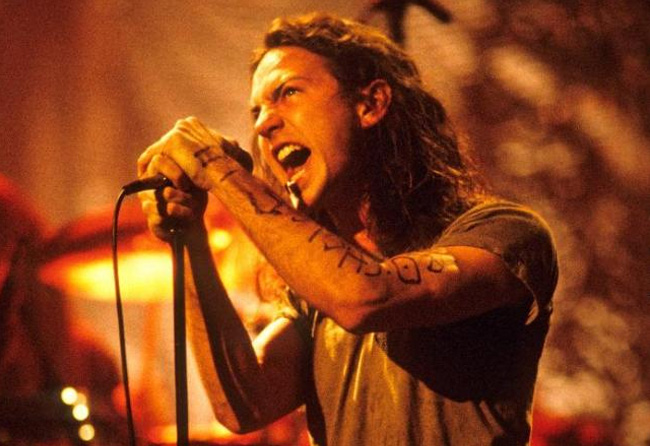
Edward Louis Severson the Third was born today in Evanston, Illinois in 1964. He took the last name Mueller after his parents, Karen Vedder and Edward Severson, divorced when Edward was a baby and his mother married Peter Mueller. The Mueller family relocated to San Diego a few years later and Eddie first picked up a guitar in middle school. Karen and Peter would divorce in the early 1980s and Eddie would learn that the man he believed was his father was actually his step-father. By the time Eddie learned this, his father was dead and that sense of alienation from his father would remain with Eddie and influence his writing throughout his career.
Eddie relocated back to the Chicago area with his mother and took her maiden name. Eddie Vedder, as we all know him now, eventually moved back to San Diego and worked odd jobs while indulging his two loves – music and surfing. He played in some minor bands and what he lacked in initial success he made up for in making some solid connections. While in a band called Indian Style, Vedder played with future Rage Against The Machine drummer Brad Wilk. He also became friends with Red Hot Chili Peppers drummer Jack Irons and it was through this relationship that Vedder got his biggest break.
Irons gave Vedder a demo tape from a band in Seattle. The band was composed of a couple of former members of Mother Love Bone, Jeff Ament and Stone Gossard, and they were looking for a lead singer. Vedder listened to the tape in San Diego then went surfing. While riding the waves he came up with lyrics for three songs, which he recorded and then mailed back to the band in Seattle. Ament and Gossard were blown away and invited Vedder to Seattle to audition.
By the time Vedder got to Seattle, Ament and Gossard, along with Gossard’s friend Mike McCready, were in the studio with members of Soundgarden working on a tribute album to former Mother Love Bone singer Andrew Wood, who had recently died. Vedder joined this collection of musicians, called Temple of the Dog, and recorded vocals on a track called “Hunger Strike”. Out of these sessions was born not only a Temple of the Dog album but also a new band called Mookie Blaylock.
The band played their first show in October of 1990 and were signed to Epic Records shortly thereafter. Epic forced the band to change their name and Pearl Jam was born. They went into the studio in March of 1991 to record their debut album “Ten” (named after Mookie Blaylock’s jersey number). The album was not an immediate hit and some claimed the band was jumping on the bandwagon of the grunge scene that was exploding out of Seattle. While it’s true that Pearl Jam came later to the game than Soundgarden, Nirvana or Alice In Chains, all the band members (minus Vedder) were active in the Seattle scene years prior.
Those accusations quickly faded away as “Ten” continued to pick up steam. By the end of 1992, Pearl Jam was a huge band and “Ten” had reached #2 on the album chart. The album would remain on the chart for almost five years, 256 weeks, and sold over 10 million copies. The success of “Ten”, coupled with the continued success of Soundgarden, caused the Temple of the Dog album to be re-released and “Hunger Strike” was released as a single. The album reached as high as #5 and “Hunger Strike” hit #4 on the singles chart.
Pearl Jam did anything but rest on their laurels after their initial success. The band realized they were just starting to scratch the surface of their capabilities and embarked on a relentless year-long touring schedule to hone their chops. At the end of the tour they went back into the studio in early 1993 to record their sophomore effort, “Vs.”. The album was released in October of 1993, it debuted at #1 and remained there for five weeks. In the first week alone “Vs.” sold 950,000 copies. To put that in perspective, the first week’s sales of “Vs.” was greater than the next nine albums on the chart combined.
Pearl Jam was now among the most popular bands on the planet and struggled to deal with the rigors of fame. The band eschewed making videos for the singles on “Vs.” and was dealing with struggles with their management. They then took on Ticketmaster in a battle to keep their concert tickets affordable. Ticketmaster refused to cooperate and Pearl Jam set out to tour on their own. This proved nearly impossible as Ticketmaster had a de facto monopoly arrangement with major concert venues across the country. The United States Congress eventually took an interest in the matter and Ticketmaster was legally required to disclose their fees, which up until that point they simply added to the ticket price.
This was a risky move for the band and it came during the height of their popularity. For many other bands this would have been career suicide but Pearl Jam continued on and flourished. They released their third album, “Vitalogy” in November of 1994 and fans snapped up over 800,000 copies in the first week. The band continued their boycott of Ticketmaster and toured sparingly in the United States. Few, if any, other bands joined the boycott and a tremendous opportunity to push back against rising ticket costs was lost.
Pearl Jam has released seven more albums since “Vitalogy”, the most recent being 2013’s “Lightning Bolt”, which became the fifth Pearl Jam album to debut at #1. Vedder has also remained active making music for movie soundtracks, recording ukulele albums, and collaborating with the likes of Neil Young, Tom Petty, the Ramones, Ben Harper and The Who. He has sold over 30 million records and won two Grammys and is a lock for the Rock and Roll Hall of Fame, probably in Pearl Jam’s first year of eligibility in 2016.
That Vedder is this successful is rather amazing when you consider his singing style and often dark lyrical content. The majority of his lyrics do not rhyme, which is a rarity in popular music. Some of Vedder’s biggest songs were about homelessness, abuse and desperation – not your typical Top 40 fare. All of this is combined with his muddied, mumbled delivery and serves as a testament to how unique and powerful a voice and performer Eddie Vedder is.
Temple of the Dog – “Hunger Strike” 1991:
“Release” off the album “Ten” 1991:
“State of Love and Trust” off the “Singles” soundtrack 1992:
“Elderly Woman Behind the Counter in a Small Town” off the album “Vs.” 1993:
“Crazy Mary” off the album “Sweet Relief: A Benefit for Victoria Williams” 1993:
“Not for You” off the album “Vitalogy” 1994:
“Red Mosquito” off the album “No Code” 1996:
“Given to Fly” off the album “Yield” 1998:
“You’ve Got to Hide Your Love Away” (Beatles cover) off the “I Am Sam” soundtrack 2001:
